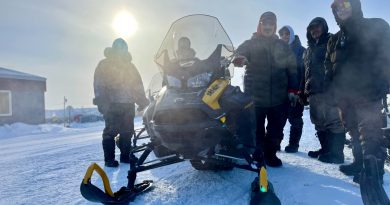White River First Nation’s solar project aims to reduce reliance on diesel power

Solar power generated will replace more than 55% of the diesel generation in the community
One of the smallest First Nations in the Yukon is making a big move toward offsetting diesel emissions in the community of Beaver Creek.
ATCO Electric Yukon and White River First Nation have signed an electricity purchase agreement to help the community achieve greater energy autonomy and generate economic benefits for the next 30 years.
With a population of approximately 93 citizens, the entire community relies on three diesel generators for their electricity.
The diesel generators are operated by ATCO Electric.
Expected to reduce CO2 emissions by 1,100 tonnes annually
One part of the agreement outlines the construction of 5,000 solar panels.
“It’s pretty exciting,” said John Vander Meer, president of Copper Niisüü Limited Partnership (CNLP), the business operations entity of the White River Development Corporation.
“We’ve been working on it for, I don’t know, four years, five years now I guess, and we’re finally getting to the point where we’re actually going to start breaking ground.”
Vander Meer said once the new facility is built, it will be owned and operated by CNLP. He said it is designed to be the largest solar project in the Yukon.
“It’s pretty big,” Vander Meer said. “From what I know, I think it’s the largest diesel offset in the Yukon for sure but probably more than that actually. I think it’s going to save 325,000 litres of diesel a year.”
It’s expected to reduce CO2 emissions by 1,100 tonnes annually and replace more than 55 per cent of the diesel generation in the community.
For Vander Meer, it’s not just a win for environmental reasons. It’s also a win economically.
“Copper Niisüü Limited Partnership is going to be power providers,” he said. “ATCO has committed to purchasing our energy for 30 years. The rates will change obviously, based on some formula on what diesel costs at the time, so it’ll be changing but it’s pretty cool.”
Expected to be operational by 2024
Vander Meer said at the moment, the site where the facility will be remains undeveloped. He said construction will begin in May 2023 with the expectation to have a fully operational facility by 2024.
He said the project has a price tag of upward of $19 million.
“White River [First Nation] has always been the smallest First Nation in the Yukon. I think to prove to everybody else that we can do this, I think it means a lot. It means a lot to the citizens. I think this is really important.”
Environmental and social benefits
Jay Massie, ATCO’s vice-president of Northern Development and Indigenous Relations, said the company’s role in the project is to “ensure that it integrates with our existing system in our power plant.”
And, Massie added, “that there is no effect on the power system or the lights that our customers see in their homes.”
He said the company also needs to install a large battery energy storage system for the project.
“This battery acts as the ‘smoothing mechanism,’ if I can put it that way, to ensure when there’s no solar being used that our power plant is still working to provide electricity seamlessly,” he said.
Massie said the project aligns with ATCO’s own goals and targets.
“One is the environmental benefit, of course, and then there’s the social governance benefit to partnering with a First Nation for a long-term contract,” he said.
“We’re so excited. We’re excited for the community. For this project. What we’ve seen in the past is that it becomes a source of pride for the community, and it should.”
Related stories from around the North:
Canada: Tarquti Energy, Hydro-Quebec deal important step towards green energy for Nunavik, Inuit leaders say, Eye on the Arctic
Finland: Lapland among regions not in favour of wind power compensation for eastern Finland, Yle News
Iceland: Iceland’s wind power working group calls for input from public, municipalities, Eye on the Arctic
Norway: Will the green transition be the new economic motor in the Arctic?, Eye on the Arctic
Sweden: Wind power to be expanded to all of Sweden, Radio Sweden
United States: Alaska’s Northwest Arctic Borough gets $2 million tribal energy grant, Alaska Public Media



